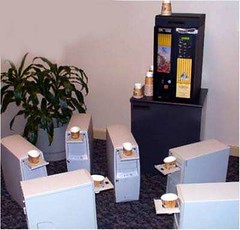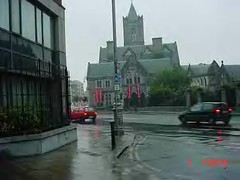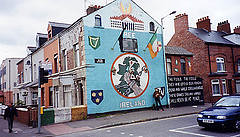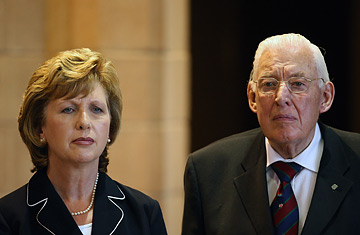Tara Hill

HARPERS OF IRELAND TO GATHER AT DÁIL TO SAVE TARA
On Saturday 22nd September 2007 at 3 p.m. the harpers of Ireland will gather at Dáil Éireann to demonstrate publicly the strength of their opposition to the destruction of historic cultural sites at the Tara/Skryne Valley as a result of the current route of the M3 motorway.
The harpers will assemble with their harps along Kildare Street, and will submit a petition to Minister John Gormley insisting he implement alternatives to the continued destruction which is taking place.Ireland is unique in having a musical instrument, the harp, as its national emblem. This indicates the primacy of the harp in Irish culture. The sites currently under threat are inextricably linked with the harping and bardic traditions for more than 2,500 years.
Tara was the gathering place for thousands of harpers to 142 kings, and the harp was an integral part of the ancient Irish parliament at Tara. The harp has been used in the coat of arms of Ireland since 1270 and is the symbol of the Irish State today. It is found in the seals of the President, Taoiseach, Tánaiste, Government Ministers, on State currency and is the insignia of the Irish Law Courts.
It is an outrage that the Irish people should be forced to choose between infrastructure and heritage. As a country we are embarrassed internationally by profit-driven, shortsighted planning as exemplified by the fact that World Monument Fund has placed Tara on its list of 100 most endangered sites worldwide.
Many can rightly point out that it would be an archaeological loss, and a historical one. It is also a spiritual loss, since even before the conversion by St Patrick of Ireland’s High Kings it was a place where the Irish sought to express their spirituality. And significantly for us as a nation, it was the place of birth of Christianity in Ireland. The gathering of harpers says that it is also a musical and cultural loss and asserts that the sound of Tara’s harp will not be drowned by traffic jams and the cash registers of toll plazas.
Harper events will also take place in NY, Chicago, and Los Angeles outside Irish Consulates.
Labels: hill of Tara








